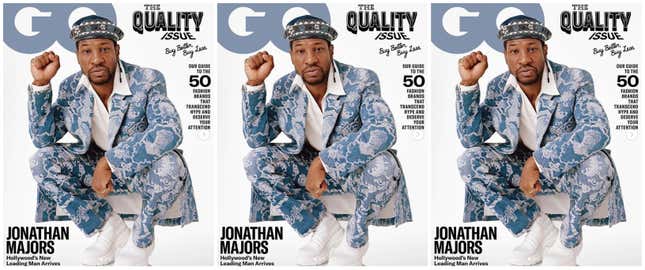
There are many qualities to love in HBO’s Lovecraft Country. There’s the centering—and survival—of Black characters and other nonwhites in the horror/fantasy genre; there’s the magnificent acting; there are the jaw-dropping special effects and period costuming; not to mention the historically relevant Easter eggs peppered throughout. It’s no wonder showrunner and co-creator Misha Green is one of our 2020 Root 100 honorees; the show is like nothing we’ve ever seen before.
Something else we’ve never seen before? A hero like Atticus “Tic” Freeman, as played by Jonathan Majors. Built like an action figure with soulful eyes and a mercurial yet magnetic personality, Majors, who describes himself as “highly physical,” is as easily as enigmatic and enticing as any episode’s plotline. This is especially true considering that in each episode, we’re treated to glimpses of his incredible arms—and then, there are those love scenes, which, well...whew.
So it was with no small amount of delight that we discovered Majors is GQ’s October cover star—photographed by Shaniqwa Jarvis, no less—for an issue rightly titled the “Quality Issue” (because, yes, he is).
In the issue, Majors discusses his dedicated and deeply spiritual journey into acting—which has, as of late, resulted in a recent string of high-profile projects, including Lovecraft, mentor Spike Lee’s Da 5 Bloods, and the upcoming The Harder They Fall, alongside Idris Elba. Obviously, progress on the production, like many others, was affected by the outbreak of COVID-19; a catastrophe Majors is somewhat philosophical about in his cover story.
“There’s a COVID test, and it’s not what you think,” Majors says. “It’s not a matter of are you positive or negative for COVID, but how are you going to make it through this moment?”
I mean, I’d just planned on watching Lovecraft on a loop until I understood what the hell was going on, but I think he’s asking us to dig deeper. In fact, Majors discloses that after growing up poor just outside of Dallas (“My shit was raggedy, man,” he says. “Payless and hand-me-downs”), he related to the Jim Crow-era terror of the series deeply.
“It’s almost as if Texas was happening in Lovecraft Country,” he tells GQ. “You get pulled over by the cops. They harass you. They call you a nigger. They make you call yourself a nigger, in front of the girl you’ve got a crush on. It would be like the worst day in Texas. I’ve experienced that day.”
Perhaps that’s why Majors found himself at the ready when conversations about racial injustice once again reached the forefront of our national conversation earlier this year. “This is our war right now,” says Majors. “And I feel very activated, and kind of enlisted.”
To hear him tell it, Majors’ greatest weapon may well be his art. “We’ve hit a point where we’re all kind of hungry,” he says. “We want the narrative to be told. We want it to be truthful. The age of authenticity is upon us now.”
“We got the ball now,” he adds. “I don’t give a fuck how you get in the door. Rob, steal, kill, hook, crook, whatever you got to do. And you’re in there, you’re in now. Go to work. Make it undeniable. It’s our job as artists to stay bold. To continue the protest, continue the year of authenticity.”

